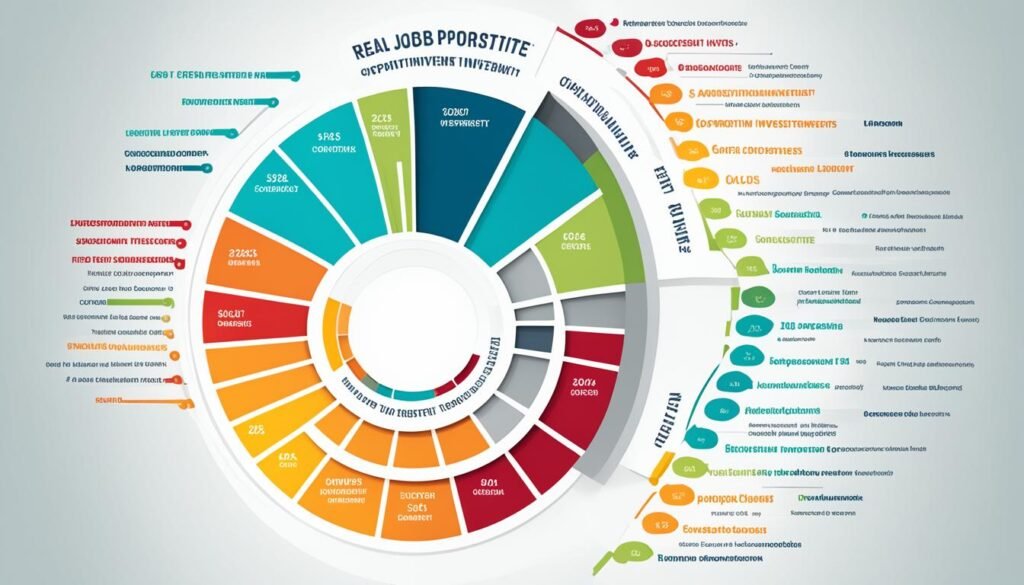The real estate job market is changing, and Real Estate Investment Trusts (REITs) are a big part of it. These investment vehicles play a key role in both commercial and residential real estate. With their growth, many career chances arise. So, how many jobs can you find in REITs?
Data tells us that the real estate field offers around 3.4 million jobs, with 326,000 in REITs specifically.1 The REIT sector is really growing. Proof? There are always 1,000-2,000 REIT jobs waiting to be filled. This speaks volumes about the job market there.2 But, the impact of REITs goes further. They also support more than 3 million full-time positions. This includes roles like brokerage, investor relations, accounting, and property management.1 This means there’s a wide range of jobs in the REIT industry.
Thinking about a career in real estate? Starting with REITs could be a smart move. You’ll find many job options, good pay, and chances for your career to grow.12
Key Takeaways
- The real estate industry employs an estimated 3.4 million people, with 326,000 of those jobs in REITs specifically.
- There are typically 1,000-2,000 open REIT positions available at any given time, showcasing the expansive job market within this sector.
- The REIT industry supports over 3 million full-time jobs across various functions, including brokerage, investor relations, accounting, and property management.
- The REIT sector offers a wide range of job opportunities, competitive salaries, and the potential for career growth.
- Exploring the REIT industry can be a rewarding career path for those interested in the real estate and investment sectors.
Introduction to Real Estate Investment Trusts (REITs)
Real Estate Investment Trusts (REITs) are companies dealing with real estate. They own, operate, or finance real estate to make money.3 By getting money from many investors, they buy and manage various real estate. This real estate is then rented out or sold to earn a profit.4 Investors can join the real estate market this way, without the need to directly own or manage property.
What Is a Real Estate Investment Trust?
A Real Estate Investment Trust (REIT) is a business focused on real estate. It owns, operates, or finances income-earning properties.3 REITs must give at least 90% of their profits to shareholders as dividends, by law. This gives investors a stable income.3 To be a REIT, a company must have over 100 shareholders in its first year.3
How Do REITs Generate Income?
REITs make money through renting and managing real estate they own.4 Most REITs are Equity REITs. They manage properties to create an income.3 Mortgage REITs, instead, earn money from loans, charging interest to those they lend to.3 There are also Hybrid REITs, which mix the two types.3 You can buy and sell shares of Publicly traded REITs easily, unlike private or non-traded ones.3
The dividends from REITs are taxed just like normal earnings. Some REITs have high fees.3 Many REITs use debt. Checking their D/E ratio before investing is smart.3 The dividends are taxed a special way for investors.3 Paper clip REITs can save on taxes. They can also manage properties they wouldn’t be able to alone, using a special two-entity setup.3
Types of Real Estate Investment Trusts
Real estate investment trusts (REITs) cover many property types, serving different investment opportunities and markets.3 They hold about $4.0 trillion in commercial real estate assets. This includes public listed, public non-listed, and private Equity and Mortgage REITs. It shows how large and varied this industry is.
Industrial REITs
Industrial REITs focus on buying and managing places like warehouses and manufacturing buildings. They take advantage of the rise in e-commerce and supply chains. Investors in these REITs get a piece of the booming industrial real estate sector.
Residential REITs
Residential REITs put money into places where people live, like apartments and student housing. Investors earn from rent and can profit from changes in where and how people want to live. This includes the growing trend of renting over owning.
Commercial REITs
Commercial REITs deal with places like offices and shopping malls.5 They put about 24% of their money in shopping spaces, making it the top investment area in the U.S. These investments can be affected by the economy, how many places are empty, and if they can get money to buy more.
Hospitality REITs
Hospitality REITs are all about places to stay like hotels. They make money from rooms, food, and drinks. The success of these REITs depends on how much people are traveling, and what they’re spending on.
Medical REITs
Medical REITs focus on places for healthcare, such as hospitals and nursing homes.5 The success of these REITs is linked to funding for healthcare, the number of people needing care, and how care is given. This area is becoming increasingly important in the real estate investment world.
REITs offer a wide range of properties, showing how adaptable the industry is to different investor needs and market trends.4 For example, healthcare-focused REITs invest in things like hospitals and nursing homes. This highlights the growing importance of healthcare in real estate investments.
Investment, Investment Portfolio, Stock Trading
Real Estate Investment Trusts (REITs) are becoming a favorite for many investors. They let people join the real estate market without owning property directly.6 REITs pool money to invest in places like stores or homes. They then give part of the rental income back to investors.6 This setup lets folks tap into real estate and maybe make money from its growth.
REITs as an Investment Vehicle
REITs offer a good way to diversify your investment mix.7 Real estate adds something unique to a financial mix, differing from regular stocks or bonds.7 By choosing REITs, you can own a bit of many properties without running them yourself.
Portfolio Diversification through REITs
Putting REITs in your mix can lower risk and boost your overall gains.7 Having a mix of investments is key for smart long-term financial planning. REITs help with this.7 They can also be good if you want investments that pay out regularly, like real estate.7
Trading REITs on Stock Exchanges
REITs can be bought and sold on big stock markets. This means you can trade in shares and be part of the real estate action. Stock market trading of REIT shares is simpler than dealing with actual properties.
REITs bring a great chance to do more with your investments. They help you mix things up, possibly earn more, and be part of real estate via the stock market.
Job Opportunities in Real Estate Investment Trusts
The real estate investment trust (REIT) business has many different jobs available. There are roles for everyone, from real estate agents and brokers to REIT analysts and asset managers. It’s a great field for those with skills and experience.
Real Estate Agents and Brokers
Real estate agents and brokers are key players in the REIT world. They help with buying or selling property. Their knowledge of the real estate market helps them make deals for REIT clients.8
REIT Analysts and Asset Managers
REIT analysts look at investment chances and market trends. They give advice to help with REIT investments. They need to know a lot about real estate, money, and risk. Asset managers make sure REIT portfolios do well, bringing in good profits for investors.8
Legal Professionals and Attorneys
The REIT business also needs legal pros and attorneys. They manage many legal and rule-following tasks. This includes writing contracts, looking over leases, and making sure REITs meet all the rules. Their work is vital for keeping REIT operations strong and reliable.
Beyond just real estate agents and brokers, the REIT industry also needs REIT analysts and asset managers, plus legal professionals and attorneys. This shows how the REIT field is varied and full of different roles. These jobs help REITs do well and grow. They’re perfect for anyone who wants to use their skills in real estate investing.89
Advantages of Investing in REITs
Real estate investment trusts (REITs) are a great way to get into the real estate market. They offer a chance for big returns. By law, REITs must give out 90% of their profits to investors each year.3 This, along with the chance for their properties to grow in value, means investors can get good dividends and their investment might grow over time.
Potential for High Returns
Investors in REITs can enjoy the real estate market’s benefits, plus possibly earn more than typical stocks.10 Often, REITs do better than the stock market over longer periods, like 10 years.10
Portfolio Diversification
Adding REITs to your investment mix can balance your portfolio. This is because they are linked to real estate but work like stocks.10 It means you have a chance at another type of income and can lower risks in your investments.
Transparency and Regulatory Oversight
REITs are also great because they are well-regulated. Government rules make sure investors know what’s going on and that their money is safe. This extra transparency makes REITs a more trusted investment choice.

Getting Started in a REIT Career
To start a career in real estate investment trusts (REITs), you need knowledge and a network.11 Think about taking courses, getting certified, or earning a degree in real estate or finance. This will set you on the right REIT career path.8
Relevant Education and Training
The REIT world offers great jobs like analysts, managers, and financial experts.8 Consider studying real estate or finance. A degree helps you learn a lot and opens job doors. REIT education is key to success.
Also, getting special certifications boosts your credibility. Two good ones are CCIM and RPA.11 They show you know your stuff.8
Gaining Practical Experience
Real-world work is very important in the REIT field.11 Getting internships or starting at the bottom helps a lot. REIT work experience is a big plus on your resume.
Through these roles, you learn a lot about REITs and make valuable contacts.8
Building a Professional Network
Networking is key to a thriving REIT career.12 Join groups like Nareit for connections and knowledge. These groups offer chances to learn, meet others, and grow your REIT networking.8
Going to conferences and finding a mentor can really help too. It keeps you up to date with the industry.8
Trends and Future Outlook
The real estate investment trust (REIT) industry is changing fast. Key trends are guiding its future. A big focus now is on sustainability and green buildings. REITs are turning towards energy-saving properties and green enhancements. They’re also building new, eco-friendly structures.13
Sustainability and Green Buildings
More people are worried about climate change. REITs are listening and moving towards sustainability. They’re using more clean energy, making buildings more energy-efficient, and getting green certifications like LEED.13 These changes help the environment and attract green investors and tenants. This push for sustainability will help the industry in the long run.
Technology and Digitalization
Technology is also a big player in the real estate world today. REITs are using data analysis and smart technologies. They aim to be more efficient and improve the experience for tenants.14 These tech upgrades will keep driving the REIT business forward, making it more transparent, cost-effective, and competitive.
Changing Demographic Trends
Demographics are changing, too. This affects which REIT properties are in demand and where the industry is heading. The older population wants more senior housing and health facilities. This has made medical REITs grow. Also, the increase in remote work is changing what kind of real estate people need. REITs must understand and react to these changes to stay important and find new chances for investment.

REITs are at the heart of the evolving real estate scene. By focusing on sustainability, tech, and matching the changing needs of people, they’re able to offer good investment paths. They’re also helping to build a real estate market that is cleaner, more efficient, and meets the needs of everyone better.
REITs and the Real Estate Job Market
The [REIT job market] is growing fast and now supports over 3 million full-time jobs.5 This shows there are many job chances in real estate for people with different skills. For instance, 65% of REITs want to hire more people next year. They need workers in roles like finance, accounting, property management, and asset management.8
Employment Statistics and Growth Projections
The [REIT job market] will likely keep getting bigger. This is thanks to its strong performance and more people wanting to invest. The FTSE NAREIT Equity REIT Index had an 8.34% average annual return over 10 years, until June 2022. This is better than the overall stock market.5 Over 25 years, the REIT index’s return was 9.05%. This beat the S&P 500’s and the Russell 2000’s returns.5 This good investment performance is why more skilled workers are needed to handle and grow these real estate investments.
In-Demand Skills and Qualifications
Prospective employees in the [REIT job market] need a mix of analytical skills, financial know-how, and a keen understanding of real estate.15 Jobs like REIT Analysts and Financial Analysts pay a good salary, around $92,158 and $95,570. REIT Investor Relations Managers can earn up to $145,338.8 People who are good at managing properties, portfolios, and developing real estate are also in high demand.
Resources for REIT Job Seekers
In the REIT job market, there are many opportunities for those starting out. It can be hard to know where to look, though. That’s why using REIT industry associations, job boards, and professional development programs is crucial.
Industry Associations and Networks
The National Association of Real Estate Investment Trusts (Nareit) is a key place for REIT job resources. It’s the top industry group for REITs and public real estate firms. Nareit offers many learning chances, like conferences and webinars, to keep up with trends.9 It also runs programs with Project Destined for summer internships at Nareit companies, focusing on diversity and inclusion.9
Online Job Boards and Listings
REIT job boards and online listings are also very helpful. Sites like the Nareit Job Board and REIT.com show many job options in finance, management, and more.9 Checking these sites often helps job seekers find good matches and new chances in the REIT job market.
Professional Development Opportunities
Developing skills is also important for REIT job searchers. The Nareit Internship Program gives students paid summer jobs at REIT companies. It helps them learn and grow in the field.9 Project Destined and other programs are joining in to provide more educational help for REIT job seekers.9
By using these REIT job resources, you can explore the industry with ease. You’ll expand your professional circle and set yourself up for victory in the rewarding realm of real estate investment trusts.
Conclusion
The REIT industry has over 3.4 million jobs in real estate. It includes 326,000 special roles in REITs.16 Jobs range from managing properties to making financial decisions. There are also legal and compliance positions. This offers many career paths for skilled people.
Changes in sustainability, technology, and demographics are shaping the REIT field.16 More skilled workers will be needed. Those looking to join REITs can use help from industry groups and online job sites. There are also training programs to help them succeed.
The REIT industry is stable and offers varied opportunities for those interested in real estate and finance.16 To do well, people must learn about REITs and meet others in the field. This helps them find success in the complex area of real estate investment trusts.
FAQ
How many jobs are available in real estate investment trusts?
The real estate industry has around 3.4 million jobs. About 326,000 jobs are in REITs. There are usually 1,000-2,000 open REIT jobs ready to be filled, showing a lot of job options in this area.
What is a Real Estate Investment Trust (REIT)?
A REIT is a business that manages or owns income-producing real estate. It gets money from investors. Then, it uses this money to buy and manage properties, which are rented or sold, offering a way for investors to make money from real estate without managing it themselves.
What are the different categories of REITs?
There are various kinds of REITs. This includes industrial ones for warehouses and factories. Also, residential REITs for homes and student housing. Then, there are commercial types for offices and shops. Plus, there are hospitality REITs for hotels and medical REITs for healthcare buildings.
What are the benefits of investing in REITs?
Investing in REITs can bring high returns. This is because they have to pay out most of their taxable income to shareholders. They also offer a way to diversify your investment within real estate. And, they are well-regulated, which helps protect investors.
What job opportunities are available in the REIT industry?
Many job options are available in the REIT world. This includes real estate agents, REIT analysts, asset managers, and legal experts. They help with buying and selling property, analyze investments, and make sure properties are doing well financially.
What skills and qualifications are in demand for REIT professionals?
In the REIT industry, good analytical skills and financial know-how are key. Knowing a lot about real estate laws and trends is also important. Having an education in areas like real estate or finance is usually preferred.
What resources are available for job seekers interested in the REIT industry?
For those looking for REIT jobs, there are many resources. Things like Nareit offer learning and networking events. Job boards dedicated to REITs and real estate are also helpful. Plus, there are programs aiming to make the industry more diverse and welcoming, such as the Nareit Internship Program and Project Destined.
Source Links
- https://www.reddoormetro.com/how-many-jobs-are-available-in-real-estate-investment-trusts/
- https://rickorford.com/how-many-jobs-are-available-in-real-estate-investment-trusts/
- https://www.investopedia.com/terms/r/reit.asp
- https://www.schwab.com/stocks/understand-stocks/reits
- https://www.investopedia.com/articles/mortgages-real-estate/10/real-estate-investment-trust-reit.asp
- https://www.investopedia.com/terms/i/investing.asp
- https://www.investopedia.com/terms/p/portfolio.asp
- https://joinhandshake.com/blog/students/real-estate-investment-trusts-career/
- https://www.reit.com/nareit/career-resources
- https://www.experian.com/blogs/ask-experian/pros-cons-investing-in-reits/
- https://www.careerprinciples.com/resources/are-real-estate-investment-trusts-a-good-career-path
- https://www.fool.com/investing/stock-market/market-sectors/real-estate-investing/reit/how-to-start-a-reit/
- https://www.morningstar.com/markets/us-stock-market-outlook-valuation-may-2024
- https://www.forbes.com/advisor/investing/stock-market-outlook-and-forecast/
- https://www.linkedin.com/pulse/fresh-look-stock-market-investing-reits-vs-real-estate-justin-goodin
- https://www.investopedia.com/terms/i/investment-analysis.asp






1 Comment
Pingback: what does standing on business mean